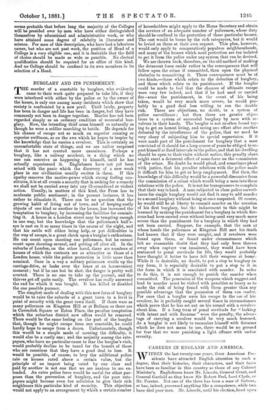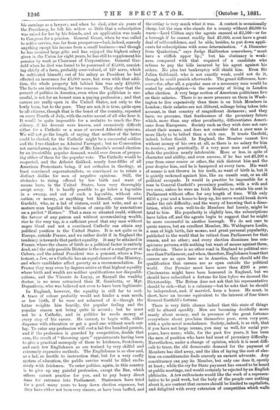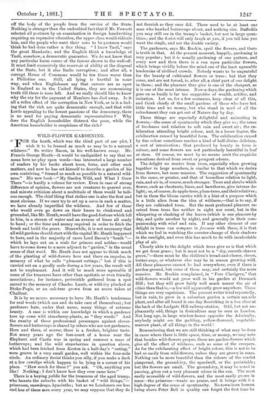CAREERS IN ENGLAND AND AMERICA.
WITHIN the last twenty-one years, three American Pre- sidents have attracted English attention to such a degree, that their histories, their characters, and their faces have been as familiar in this country as those of any Cabinet Minister's. Englishmen know Mr. Lincoln, General Grant, and General Garfield as they know Sir Robert Peel, Lord Clyde, or Mr. Forster. Not one of the three has been a man of fortune, or has, indeed, possessed anything like a competence, while two have died poor men. Mr. Lincoln, until his election, lived upon his earnings as a lawyer ; and when he died, after six years of the Presidency, he left his widow so little that a subscription was raised for her by his friends, and an application was made to Congress for a pension. General Grant, when he was called to active service, was far from prosperous—had, indeed, scarcely anything except his income from a small business—and though he has received large gifts and has enjoyed the highest salary given in the Union for eight years, he has still to supplement his pension by work as Chairman of Corporations. General Gar- field when he died was found to be possessed of £5,000, consist- ing chiefly of a farm, probably over-valued, of 120 acres, which he cultivated himself; out of his salary as President he had effected an insurance for £5,000 more, but even with that addi- tion, the whole property left behind him was only £10,000. The facts are interesting, for two reasons. They show that the pursuit of politics in America, even when the politician is suc- cessful, is not for an honest man a paying profession ; and that careers are really open in the United States, not only to the lowly born, but to the poor. They are not, it is true, quite open to all citizens, though that is the boast of the country, repeated on every Fourth of July, with the entire assent of all who hear it. It would be quite impossible for a mulatto to reach the Pre- sidency, if his descent were known, and excessively difficult either for a Catholic or a man of avowed Atheistic opinions. We will not go the length of saying that neither of the latter could be elected, for the Catholic might be a successful soldier, and the F ree-thinker an Admiral Farragut ; but no C onvention not carried away, as, in the case of Mr. Lincoln's second election, by an irresistible popular demand, would ever dream of propos- ing either of them for the popular vote. The Catholic would be suspected, and the Atheist disliked, nearly four-fifths of all American Protestants being, if not orthodox in theology, at least convinced supernaturalists, so convinced as to retain a distinct dislike for men of negative opinions. Still, the obstacles to rising offered by low birth and want of means have, in the United States, been very thoroughly swept away. It is hardly possible to go below a log-cabin in a swamp, and out of such a log-cabin, without edu- cation, or money, or anything but himself, came General Garfield, who, as a lad of sixteen, could not write, and as a mature man beguiled the tedium of camp-life by annotations on a pocket "Horace." That a man so situated could, without the favour of any patron and without accumulating wealth, rise to the very top, is a sufficient proof that any man without negro blood and not a convinced Catholic can attain any political position in the United States. It is not quite so in Europe, outside France, and we rather doubt if in England the tendency is towards that perfect equality. It may be attained in France, where the charm of birth as a political factor is entirely dead, and the only possible Dictator is the son of a small grocer at Cahors, and the actual President was a peasant, where a Pro- testant, a Jew, or a Catholic has an equal chance of the Ministry, and where candidates affect poverty as a recommendation. In France they may even by degrees arrive at that highest equality where birth and, wealth are neither qualifications nor disqualifi- cations, and the Vicomte de Lucay, or Raspail the wealthy doctor, is no more ostracised than M. Gambetta, or Mgr. Dupauloup, who was believed not even to have been legitimate.
In England, however, the equality is still far to seek. A trace of colour probably would not hinder a man much, or low birth, if he were not ashamed of it—though the latter weights him heavily, the popular feeling and the popular reason not being quite in accord ; but he must not be a Catholic, and in politics he needs money at every step of his career. He cannot, to begin with, either dispense with education or get a good one without much out- lay. To enter any profession will cost a lad five hundred pounds, and if the profession is guarded by competition, double that sum, the result of "throwing open" appointments having been to give a practical monopoly of them to Irishmen, Scotchmen, and such few Englishmen as are trained by very skilful and extremely expensive methods. The Englishman is so slow and, as a lad, so hostile to instruction that, but for a very costly system of education, the public service would be filled exclu- sively with Irishmen. To enter politics, again, in this country is to give up any gainful profession, except the Bar, which others cannot practise for you, and to pay heavy direct fines for entrance into Parliament. Statesmen have tried for a good many years to keep down election expenses, but they have either not been very sincere, or have been baffled, and
the outlay is very much what it was. A contest is occasionally cheap, but the man who stands for a county without 26,000 to waste—Lord Clifton says the agents sneered at 22,500—or for a borough if he cannot readily find 21,000, must have a great deal of self-confidence, and be able, besides, to put down appli- cants for subscriptions with some determination. "A Dissenter from Quakerism," says Judge Haliburton somewhere, "must have a stiffish upper lip ;" but his obstinacy is weak- ness, compared with that required of a candidate who refuses to pay the bills incurred by his agent against his orders. No plea but bankruptcy will shield him. Even Sir Julian Goldsmid, who is not exactly weak, could not do it, though he could punish afterwards. The grand difference, how- ever—for, after all, a popular man or a necessary man would be seated by subscription—is the necessity of living in London after election. A very large section of American politicians live on their salaries. There is no more pressure on them in Wash- ington to live expensively than there is on Irish Members in London ; their salaries are not illiberal, mileage being taken into account, in that country of magnificent distances ; and they have, we presume, that fearlessness of the pecuniary future which, more than any other peculiarity, differentiates Ameri- cans from Europeans. Society such as they wish does not care about their means, and does not consider that a poor man is more likely to be bribed than a rich one. It trusts Garfield, indeed, before Gould. In England, the Member cannot live without money of his own at all, as there is no salary for him to receive ; and practical]y, if a very poor man and married, finds the position nearly intolerable. More or less, in spite of character and ability, and even success, if he has not 21,200 a year from some source or other, the rich distrust him and the poor despise him, and he is hampered at every turn. His want of means is not thrown in his teeth, as want of birth is, but it is quietly reckoned against him, like an unsafe seat, or an old. political escapade. It would in practice be impossible for a man in General Garfield's pecuniary position, with a wife and two sons, unless he were an Irish Member, to retain his seat in Parliament without office for any length of time. With only £250 a year and a house to keep up, his nerve would break down under the cab difficulty, and the worry of knowing that a disso- lution, which even well-to-do Members feel keenly, might be fatal to him. His popularity is slightly less, the subscriptions have fallen off, and the agents begin to suggest that he might be more successful in another borough. We do not care to quote names, but an excellent Member, Mr. Waldegrave Leslie, a man of high birth, fair means, and great personal popularity, published to the world that he retired from Parliament for that reason, and no other ; and every election dismisses less con- spicuous persons, with nothing but want of means against them, to oblivion. There is no other road in England to political suc- cess than Parliament; and when, therefore, Englishmen boastthat careers are as open here as in America, they should add the qualification that careers are as open outside the political world. Our Premier must have more than 2200 a year. Cincinnatus might have been honoured in England, but we should have subscribed a fortune for him before we decreed the Dictatorship. The Briton does not ask that his representative should be rich—that is a calumny—but he asks that he should be independent, and, if married, keep a house. He must, in short, have an income equivalent to the interest of four times General Garfield's fortune.
There is very little chance indeed that this state of things will be altered speedily. Men are becoming decidedly more manly about money, ana in presence of the great fortunes everywhere about proclaim themselves poor, even very poor, with a quite novel nonchalance. Society, indeed, is so rich, that if you have not large means, you may as well, for social pur- poses, have none ; while, for the past five years, it has been the men of position who have had most of pecuniary difficulty. Nevertheless, under a change of opinion, which it is most diffi- cult to trace, the old democratic demand for the payment of Members has died away, and the idea of laying the cost of elec- tion on constituencies finds scarcely an earnest advocate. Any constituency can pay its Member, but only one does it, openly at least ; while the cry for State payment has ceased to be heard at public meetings, and would certainly be rejected by an English plebiscite. A few enthusiasts would like the work of a represen- tative to be paid work, but the body of the people care nothing about it, are content that careers should be limited to capitalists, and delighted with every extension of competition which walls off the body of the people from the service of the State. Nothing is stranger than the undoubted fact that if Mr. Fawcett selected all postmen by an examination in foreign handwriting requiring an expensive education, the upper class would ridicule him, and the people who want their sons to be postmen would 'think he had done rather a flue thing. "I know Taoli," says the great Mandarin ; and the English think a knowledge of Taoli, somehow, a democratic guarantee. We do not know that any particular harm comes of the favour shown to the well-off. It must linait excessively the reservoir of ability at the disposal .of the State, but it also limits corruption ; and after all, a corrupt House of Commons would be ten times worse than
a Philistine one. Still, all lying, is hurtful in some way, and when Englishmen say that careers are as open in England as in the United States, they are economising truth till there is none left. And we really should like to know why the cry for the payment of Members has died away. Is it -all a reflex effect of the corruption in New York, or is it a feel- ing that the rich are quite democratic enough, and that with Lords appealing to the lowest passions of the democracy, there is no need for paying democratic representatives P Why -does the English householder distrust the poor, while the American householder is suspicious of the rich ?
































 Previous page
Previous page